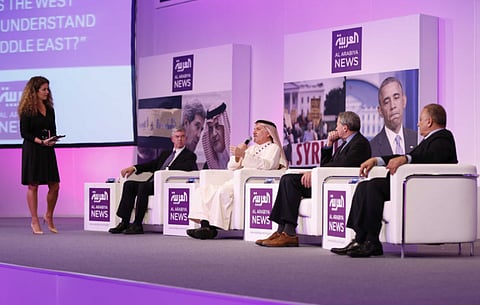Arabs and the West: Forum highlights the need to improve awareness
Forum highlights that Arabs need to do more to change how they are perceived in the West

Dubai: Arabs complain of prejudice in the way Westerners view them, and they know they are partly to blame for it. Many Westerners say they are more aware of Arabs and their political and social issues, today, more than before.
Arabs need to do more at home and abroad to change perceptions, and whether it is important “how the US perceives Arabs” were among the conclusions of a forum held in Dubai recently.
Participants said Arabs need to speak to different segments of western societies, present their culture, organise and unite their efforts abroad, and correct the image of Islam — the dominating religion in most Arab countries in the Middle East. Islam’s image was tarnished in the West and the US even more so after 9/11.
“I don’t understand the obsession Arabs have, when they wake up every morning, what do they the US thinks of them,” asked Charles Glass, a veteran journalist and an analyst on Middle East issues with NBC news. What is important for the Arabs “is what they think of themselves,” he said during the forum which was held to mark the relaunch of the Al Arabiya News website and the 10th anniversary of Al Arabiya News Channel, a Saudi-owned pan Arab news station.
Other intellectuals echoed similar sentiments.
“Why don’t we ask what the Chinese and Indians think of us,” said Khalid Al Maeena, Editor-in-Chief of the Saudi Gazette newspaper, who was also on the panel. However, the answer was obvious to many Arabs.
“The US is very important to the Middle East... How the US sees us will affects US policies,” noted Talal Al Haj, Chief of Al Arabiya News Channel Bureau in New York and the UN. He noted there is a lack of Arab public diplomacy.
He said there is not a singular Arab cultural centre in a big and important city like New York, which he described as “financial hub of capitalism”, while many other countries, including relatively newly independent nations, have one.
Arabs need to focus on talking to other people from other cultures. So far, the discussions are limited between elites from both sides, noted participants, while it should be “people to people”.
“Whom we go to is what is important” said Al Maeena. Part of the audience pointed out the negative image Hollywood gives of Arabs.
“I am aware of the negative stereotypes portrayed in Hollywood, but also of the discrimination in covering Arabs or Arab affairs in some Western news outlets,” said Princess Rym Al Ali, founder of the Jordan Media institute in Amman. “It remains our duty to fight every word that is anti-Arab or discriminating against us,” she added.
To have a stronger lobby in the western powers will opens doors to let their voices be heard in different influential circles, the participants noted. However, even in this area, the Arab immigrants have other problems that prevent them from carrying out this role.
“There are Arab-American communities not one,” said Hisham Melhem, Al Arabiya’s Bureau Chief in Washington, DC.
Referring to all Arab-Americans, he added the Arab world has “a long way to go” in making its voice heard.
“Arab-Americans need to fully integrate in their new environment, have the financial resources and participate in politics. I have met Arab-Americans who are married to Americans, who still say “us and the Americans! us and the Americans”, Melhem said with a surprised tone.
In the UK, it is a similar story.
Chris Doyle, the director of The Council for Arab-British Understanding (CAABU), said “we never had a Member of Parliament of Arab origin.”



